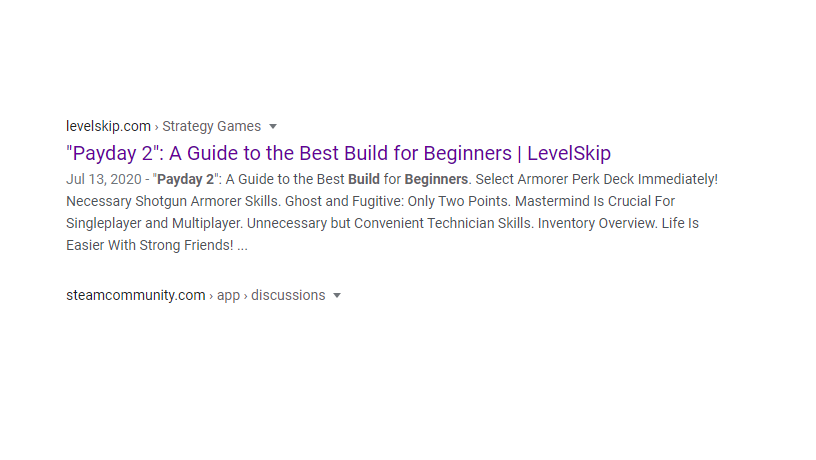What's the point of adding a summary when it gets changed?

My article for, "Payday 2," is number one on google, which I found out for the first time today forgetting I had even written it, and when it came up first I was like, "Oh wow!"
I wasn't surprised to see it at number one, however, I was surprised to see what they did to the summary. The summary is something I never, not in a million years, would've written for myself. It is ugly, it is off-putting, and I don't understand it.
Perhaps someone here can give me a coherent, or otherwise pretentious response that explains why they would forcefully jam all my subtitles into the summary? Also, why the heck does a format that shoehorns the subtitles into a nonsensical summary make it to number one on google over a more relatable, sensible summary?
I mean, the summary isn't even something a player who has been playing a while would understand; it just looks like a garbled mess of nonsense. Luckily, it has consistent traffic and impressions despite this, but I'd still like it to look more professional and I'm scared to touch what the editors did.
Thanks to anyone who responds beforehand, regardless of the type of response.Google at times decides to create a summary of their own taking pieces from around the article in the hope that it is better suited to the query than the summary you set up. Google does not always show your summary, in fact it rarely does. But the times it does, it is nice to have a well written one. It is more likely to show your summary if the summary you create has the terms in the search query.
I don't want to burst your bubble, but you are probably #1 because you have visited that page in the past. It shows from the colour of the link.I wish that were the case, then I'd visit all my links. I can't find most of my articles on google without hitting the second and onward pages, even after visiting them.
Nonetheless, google shows the summary regardless of what I type to find it so I still don't understand the ugly summary. Google always shows summaries, the same summaries, for me. In what context does google not show a summary?
I even get summaries on sublinks (for lack of a better term).Google shows you results based on what it thinks you want to see. If you visit hubpages and the niche sites a lot, the probability of them ranking higher increases. The pages you see as #1 are most likely on the first page for most users, whereas the ones on the 2nd and 3rd page are most likely no where to be found for other people, for those specific terms.
To find out where you actually rank, one possibility is to clear cache and go incognito, but this is not full-proof either.
Google always shows a summary.The article is ranking first for multiple other individuals, and the impressions and traffic infer a high ranking regardless. I really don't care about the rank, it was unsurprising to be number one because of the key words and phrases I used. Back on the real topic:
Are you able to explain the answer to my original question in the context of how that ugly summary plays out with SEO? Despite my traffic and impressions, if I were a reader (one who reads summaries before clicking like I am) I'd immediately veer off of that article for the next with a favorable summary. If Google thinks this is appropriate, I need to know why so I can work toward emulating their strange standards.I already answered that question in the words of John Mueller, look up his explanation if you want to know the words from Google. Different people are going to get different descriptions too.
This is what I get:
"Payday 2": A Guide to the Best Build for Beginners | LevelSkiplevelskip.com › Strategy Games
Jul 13, 2020 - The best build for "Payday 2" beginners and new players would have to be the shotgun armorer build. This is an easy-to-follow guide with ...Hmmmm, I still don't understand why they're presenting this jumbled mess to others but thanks for your input!
Some of my listicles have google summaries that are a mess of my headers. No idea why and honestly I don't bother much. When I check using services like Ubersuggest, these lists still rank tops.
Thank you, all three of you, for your responses. I guess I'll accept that Google is an enigma that knows what it's doing.
- Marisa Writesposted 5 years ago
0
An enigma,yes. Knows what it's doing? Not so sure about that sometimes...
In my opinion, they don't really know what they are doing either. It's so often that they make a change to revert it a few days or weeks later. Many recent Google updates are only undone with the next one with websites that tanked claiming back their old spots. I guess they just work with the data they have on hand without putting a lot of actual thought, it seems to work for them.
I think the issue here is with relevancy. The search terms have to be in the summary and the algorithms hit there straight away; If Google thinks you have them in 2-3 words, then it will take your summary.
Google is mostly concerned about user true intent and it serves them by a summary.Not true. You can have the exact term in the summary and Google may not show it. Google does not always trust summaries i.e. meta descriptions and they therefore often pick up stuff from the article body instead. They do sometimes, albeit less and less these days show the exact summary and I would assume this is in cases where their algorithms have decided that the summary in a particular instance has the actual info the person seeks and it does in fact cover what the article is about.
Thanks, Brandon, you gave a clearer picture.
Related Discussions
- 23
Number of words in the summary. Am I missing something?
by Mary Hyatt 12 years ago
It is so tough for me to write a summary and keep it within the word limit. When you reach the limit, that's it....I see other summaries that are quite lengthy when I see other Hubs. Is there a "work around"?
- 7
Has anyone noticed an increase in traffic after adding a "summary" ?
by danielleantosz 13 years ago
Has anyone noticed an increase in traffic after adding a "summary" ?I tried adding summary to a few of my most visited hubs and a few of my least visited hubs to see if there is any benefit from having summaries. What have you guys experienced?
- 45
My Google de-ranking discovery.
by thoughthole 13 years ago
My goodness, I have read oh so many forums trying to figure out why my once flourishing hubs suddenly took a devastating nosedive. I have learned a lot from others comments & shared experience. I have also recognized that there seems to potentially be a number of possible reasons why many hubs...
- 26
Is anyone else afraid of adding summaries to their hubs?
by Jamie Brock 9 years ago
Is anyone else afraid of adding summaries to their hubs?In general, my hubs that have a summary do not do as well as my hubs that do not have a summary. All of my best hubs do not have summaries. I know it is suggested to add a summary to every hub but this makes me afraid...
- 18
Summary-300 characters
by Geri McClymont 7 years ago
The character limit for our article summary is 300 characters, yet only a portion of those characters show up beside our article on our profile page. Does anyone know if it is advantageous --in terms of generating more views--to leave our article summary at 300 characters (and not worry about a...
- 35
How many hubs left do you need to write summaries for?
by Rosemary Amrhein 14 years ago
I have 53 left out of 177!I never knew we were to write summaries!










